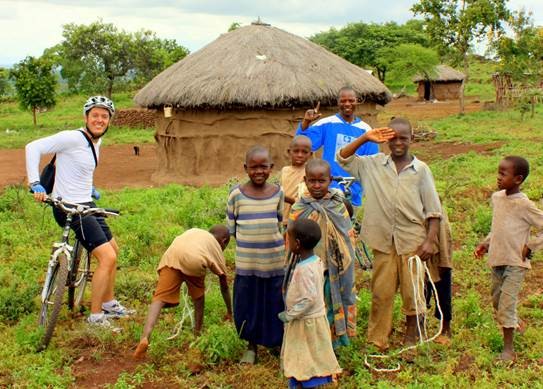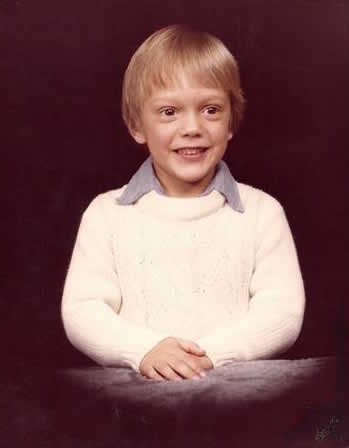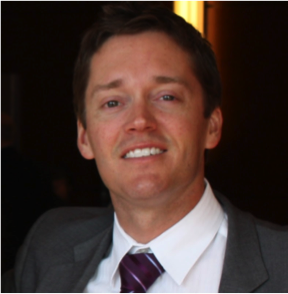- What We Do
- Agriculture and Food Security
- Democracy, Human Rights and Governance
- Economic Growth and Trade
- Education
- Ending Extreme Poverty
- Environment and Global Climate Change
- Gender Equality and Women's Empowerment
- Global Health
- Water and Sanitation
- Working in Crises and Conflict
- U.S. Global Development Lab
Medical Officer, USAID Office of HIV/AIDS
Staff Spotlight is a series created by the USAID Global Health Communications Team that features personal interviews with USAID global health staff. By sharing the stories of various staff members’ backgrounds and experiences, we hope this series will help bring USAID’s global community closer together. This week we’d like to introduce Ryan Phelps, Medical Officer, USAID Office of HIV/AIDS.

Q: How did you get involved in development work?
A:I grew up in the woods outside of Denison, a small north Texas town of about 20,000 near the Texas-Oklahoma border. I knew the world was a big place, but didn’t know much of it (or too much about it).
At age 15, I traveled with my family to Honduras as part of a medical assistance team. Though my Spanish was very limited at the time, I managed to make myself useful on that first trip by fitting prescription eyeglasses alongside the team’s optometrist. Some of those that needed corrective lenses were kids around my age. But they were different. They had worn-out clothes and shoeless feet. Many had bad cavities. With their new eyeglasses, they would watch from a distance as the team of ex-pats ate lunch, hoping for leftovers.
After two weeks in Honduras, I returned home to a cupboard stacked with food and a closet full of clothes and shoes, most essentially new. My house and my hometown were the same as before, but I saw them differently.
As I transitioned from adolescence to early adulthood, I returned to Central America several times. As my worldview sharpened, I came to see a couple of things more clearly: (1) People all over the world have critical, basic needs that remain unmet; (2) If I wanted to, I could help meet those needs, at least in some small way.
Well, I wanted to.
In college, I pursued a broad education (with a focus on Latin America) and spent a year in Brazil. I condensed my medical and public health studies into four years, followed by three years specializing in pediatrics. At that time, the U.S. President’s Emergency Plan for AIDS Relief (PEPFAR) was well underway, and Texas-based Baylor College of Medicine was hiring pediatricians to live and work in Africa. I joined the medical school faculty and, over the next four years or so, practiced medicine in Swaziland and Botswana. My patients were children and parents living with HIV.
I wrote hundreds of prescriptions for antiretroviral drugs. I watched skeletal, bedbound children become plump and playful. I saw the deaths in Swaziland’s hospital wards begin to decrease. Mothers starting HIV medicines during pregnancy gave birth to HIV-free babies.
I lost count of the number of times that mothers and fathers would watch their children abruptly turn away from death’s door and then thank me for the transformation. I found such gratitude unsettling, for not only did I love the work, but I was only seeing a couple dozen children a day when hundreds of thousands went without therapy.

After gaining some on-the-ground, clinical expertise as one of fewer than ten pediatricians in all of Swaziland, I sought ways to amplify my impact. I helped train other local providers. I began to help manage projects and programs; some funded by pharmaceutical companies and private donors, others funded by USAID and PEPFAR.
In late 2009, I joined USAID’s Office of HIV/AIDS as a senior advisor in pediatric HIV and its prevention. In my current position, I have the opportunity to help ensure that monies set aside to respond to this emergency are appropriately invested in countries with a high HIV burden so that we may someday have a generation of children who are AIDS-free.
Q: If you weren’t working in development or public health, what would you be doing? Why?
A: I would likely practice general pediatrics locally. Even in Northwest Washington, DC where I live, there is much work to be done to ensure that children receive basic health care. I currently volunteer as a clinician at a community clinic, where many of those seeking medical assistance are uninsured (or underinsured) and speak little English. My current USAID job entails supporting programs and clinicians that provide basic, life-saving clinical services in faraway places, but one does not have to look very far to find unmet need.
Q: What might someone be surprised to learn about you?
A: For a year after high school, before starting college, I performed with a singing and dancing group called “Up With People.” While traveling throughout the United States and Europe with this group of ~150 young people from 27 countries, we performed a diverse, musical variety show covering current events (geopolitics, environmental issues, etc.). On stage, I performed American Swing and Russian dances, delivered stand-up comedy, and sang baritone in several languages. Fortunately, all of this was before YouTube.

Q: What’s the hardest thing you’ve ever done?
A: It was early February, 2007 in Swaziland. A father walked into my clinical exam room, looked up at me and said, “My baby is gone.” I gave him a puzzled look, and asked, “Where?”
A week before, that baby had been in his mom’s arms in that same room. I had watched the infant eat vigorously and I treated his oral thrush. The child had been born over two months premature and, against significant odds, had survived for four weeks. I had congratulated the parents on helping the baby, whose immune system was very weak, to gain weight and strength. I had believed that the child was going to survive. I was the last doctor who saw him.
After I asked “where”, the father leaned toward me, and with the soft, throaty voice of one deeply burdened spoke one word: “funeral.”
There are instances in life when hope flickers, and in its absence only humiliation remains. For me, that was one such instance.
The next thing I said was, “I am so so sorry,” but I knew nothing of such sorrow. This man, a week before, had told me he would do anything for his baby. His wife, the mother of his now-deceased infant, was fighting AIDS, and was in danger of dying any day, even with careful treatment. I can say as many “so so sorry’s” as I want but cannot imagine such pain.
The father must have noticed the void, hopeless look in my eyes, for he put his right hand on my shoulder and said to me, “It is all ok. It is all with God. God knows.”
After a few seconds, I said goodbye to the bereaved man, walked down the hall, up the stairs, and to the closet where we kept the medical charts. Per clinic protocol, I wrote the letters "R.I.P." on the manila folder encasing the infant’s brief medical history.
This was the hardest thing I have ever done.
Q: If you could witness any event -- past, present or future -- what would it be and why?
A: Honestly, I have no interest in time travel. When I am at my best, my favorite event is the present moment. It is there (well, “here”) that I am able to ensure that the wonders of the everyday do not pass unnoticed.
BUT…if I really must choose, I’d like to “be present” when the USA men’s soccer team one day wins the FIFA World Cup. (The women’s team already has…twice.)
Actually, no. I’ll wait. 2018 isn’t too far off, and “I believe that we will win.”
PAST SPOTLIGHTS
Kent Klindera, Health Systems Strengthening Advisor for HIV/AIDS
Nithya Mani, Implementation Support Division Chief for HIV/AIDS
Diana Frymus, Health Systems Strengthening Advisor for HIV/AIDS
Sherif Mowafy, Deputy Division Chief, Supply Chain Management System for HIV/AIDS
Ryan Phelps, Medical Officer, USAID Office of HIV/AIDS
Kendra Phillips, Implementation Support Division Chief, USAID Office of HIV/AIDS.
Margaret McCluskey, Senior Technical Advisor for Vaccines, USAID Office of HIV/AIDS.







Comment
Make a general inquiry or suggest an improvement.